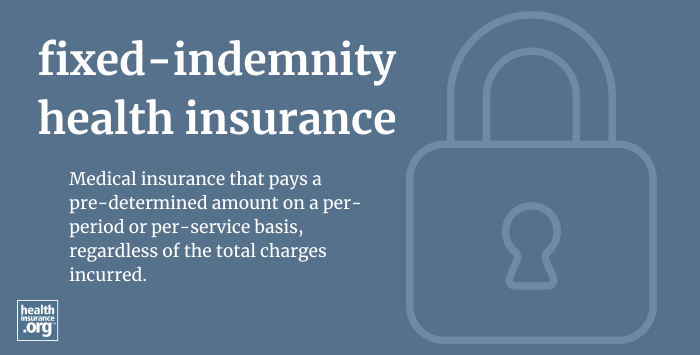
What is fixed-indemnity health insurance?
Fixed indemnity health insurance is a type of medical insurance that pays a pre-determined amount on a per-period or per-service basis, regardless of the total charges incurred. Plans might pay $200 upon hospital admission, for example, or $100 per day while a person is hospitalized, or $50 for an office visit.
(Plans that pay on a per-service basis — for example, per office visit or per surgery — are only allowed in the individual market, but not in the group market.1 More on this below.)
Is fixed-indemnity health insurance regulated by the ACA?
Fixed indemnity health plans are not regulated by the ACA, do not have to provide coverage for essential health benefits, can exclude pre-existing conditions, and have annual and lifetime benefit limits (as well as defined benefit limits for all services, as that's their service model). People who have fixed-indemnity plans without additional minimum essential coverage are subject to an individual mandate penalty if they're in a state that imposes a penalty for going without health coverage (unless they qualify for an exemption), as a fixed-indemnity plan does not count as having insurance.
What's the difference between per-period and per-service fixed indemnity coverage?
The original rules released by the Department of Health and Human Services stipulated that fixed-indemnity plans would only be exempt from Affordable Care Act regulation if they paid benefits on a "per-period" basis as opposed to a "per-service" basis. (So for example, they would need to pay a fixed-dollar amount per day in the hospital, as opposed to paying a fixed amount for each doctor visit, prescription, surgery, etc.)
In early 2014, HHS proposed relaxing those guidelines and allowing per-service fixed-indemnity plans to be exempt from Obamacare rules, as long as they were only sold to people who have minimum essential coverage in place through another policy (among other requirements).
But health insurers (along with 11 states that joined an amicus brief) took legal action against HHS, and in July 2016, a federal appeals court struck down the HHS provision that limited the sale of fixed-indemnity plans only to people who also had minimum essential coverage in place.
The rule did get relaxed to allow the sale of individual-market fixed-indemnity plans with per-service benefits, rather than just per-period benefits. But in 2023, the federal government proposed a change to that. The proposed rule would have required individual-market fixed-indemnity plans to operate on a per-period basis (but not on a per-service basis), which is how the rules already work for fixed-indemnity products in the employer-group market.2
This rule change was proposed to prevent fixed indemnity plans from being designed with fee schedules that resemble major medical coverage at first glance, in an effort to minimize consumer confusion. Ultimately, that rule was not finalized, but HHS noted in 2024 that they may revisit this issue in future rulemaking.3
So for the time being, fixed-indemnity plans sold in the individual market can continue to pay benefits on both a per-period basis (example: $500 per day in the hospital) and a per-service basis (example: $75 per office visit), while group fixed-indemnity plans can only pay benefits on a per-period basis.
Footnotes
- “Final Rule on STLDI and Indemnity Plans” The Bolton Blog. April 5, 2024 ⤶
- “Short-Term, Limited-Duration Insurance; Independent, Noncoordinated Excepted Benefits Coverage; Level-Funded Plan Arrangements; and Tax Treatment of Certain Accident and Health Insurance (CMS-9904-P)” Centers for Medicare and Medicaid Services. July 2023. ⤶
- “Short-Term, Limited-Duration Insurance and Independent, Noncoordinated Excepted Benefits Coverage” Internal Revenue Service; Employee Benefits Security Administration; Health and Human Services Department. April 3, 2024 ⤶
